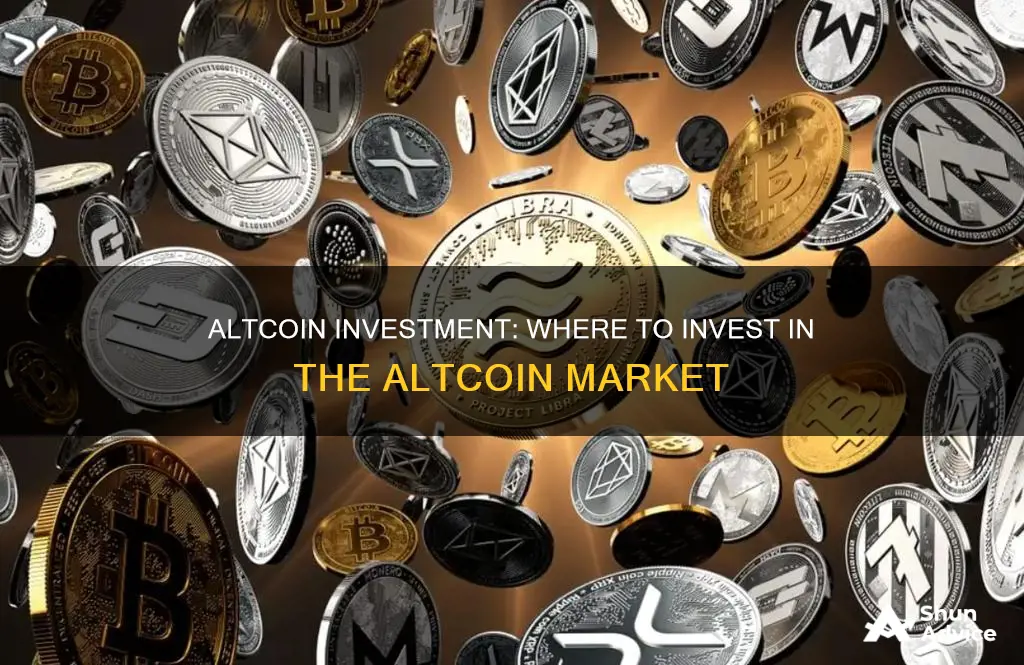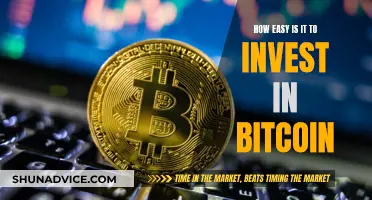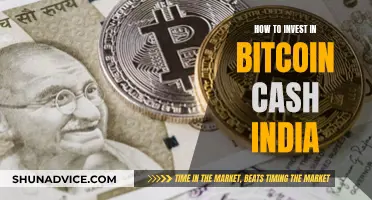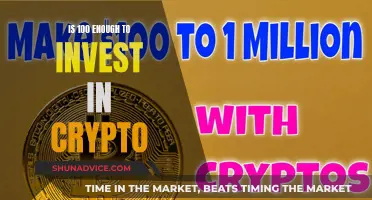
Altcoins are any cryptocurrency that is not Bitcoin. Ethereum is also excluded by some people from the definition of an altcoin, given its status as the second-largest cryptocurrency by market cap. Altcoins are generally riskier investments than Bitcoin and Ethereum, but they offer a much higher upside in terms of percentage gain.
There are thousands of altcoins on the market, including Litecoin, Dogecoin, Cardano, and Solana.
If you want to invest in altcoins, it's important to do your research. More than 50% of altcoins have failed since 2014, so it's crucial to understand the risks and choose your investments carefully. You should also consider using a reputable exchange, such as Coinbase, Binance, or Crypto.com, and only invest money you can afford to lose.
| Characteristics | Values |
|---|---|
| Definition | All cryptocurrencies other than Bitcoin (and, for some people, Ethereum) |
| Types | Payment tokens, stablecoins, security tokens, utility tokens, meme coins, governance tokens |
| Pros | Improve upon another cryptocurrency's weaknesses, higher survivability, thousands to choose from |
| Cons | Lower popularity and smaller market cap, less liquid than Bitcoin, difficult to determine use cases, many scams |
| Best Altcoins to Buy | Ethereum, Solana, Ripple, Polkadot, Dogecoin, Bitcoin Cash, Compound |
What You'll Learn

Best Altcoins to Buy
Where to buy altcoins
Before we get into the best altcoins to buy, it's important to know where to buy them. There are hundreds of cryptocurrency exchange platforms available, but some of the most reputable include Coinbase, Binance, Kraken, and Crypto.com. These platforms are generally considered safer for beginners, helping users avoid fraud.
The best altcoins to buy
Now, here are some of the best altcoins to consider buying:
- Ethereum (ETH): The biggest altcoin on the market, Ethereum is a distributed computing network where users can run decentralised applications and host smart contracts. While it has been criticised for high transaction fees, it has thousands of apps and other altcoins powered by its blockchain.
- Binance Coin (BNB): This utility token can be used to pay trading fees and get discounted trades on the Binance exchange. It can also be used outside the exchange for payment processing, such as booking travel arrangements. However, critics say it isn't as decentralised as other altcoins.
- Solana: One of the fastest blockchains, Solana is a top altcoin disruptor, leading in NFTs and used for deploying tokens. It runs on a unique hybrid proof-of-stake and proof-of-history mechanism to process transactions quickly and securely. However, it has been criticised for being too centralised.
- Ripple (XRP): XRP can be used to facilitate exchanges of different currency types with digital technology and payment processing company Ripple Labs. It offered the first decentralised exchange and is known for being greener than other cryptocurrencies.
- Dogecoin (DOGE): The original meme coin, Dogecoin was started as a joke in 2013 but has since become a prominent cryptocurrency thanks to a dedicated community and creative memes. However, it is considered riskier than Bitcoin.
- Toncoin: Developed by Telegram, Toncoin is a Layer-1 blockchain designed for swift transactions and minimal fees. It is part of the Telegram Web3 ecosystem but has gained more independence.
- Cardano (ADA): Cardano was an early adopter of the proof-of-stake consensus mechanism, which speeds up transaction times. It also emphasises environmental sustainability. However, some say it has promised too much and has yet to deliver.
- Shiba Inu (SHIB): Created by an anonymous developer, this Ethereum-based meme coin was developed to discover if an organisation could work without central leadership. It briefly supplanted Dogecoin as the world's most valuable meme coin by market cap in October 2021.
- Avalanche: A layer-one blockchain for dApps and other networks, Avalanche is a rival to Ethereum. It aims to unseat Ethereum as the blockchain of choice for smart contracts by offering higher transaction output without affecting scalability.
- Tron: Founded in Singapore in 2017, Tron has grown into a fully decentralised autonomous organisation with more than 167 million accounts. Its cryptocurrency has grown by 5,380% since its launch, making it one of the world's fastest-growing cryptos.
- Polkadot (DOT): This altcoin powers the Polkadot ecosystem, where developers can build specific-purpose blockchains. It has better-shared security and is a leader in developer activity, but project progress has been slow, and it lacks star applications.
Things to consider before investing in altcoins
While the above list can give you an idea of some of the more popular altcoins, it's important to do your own research before investing. Here are some things to consider:
- Understand the risks: Altcoins are incredibly risky investments. Make sure you understand these risks and only invest money you can afford to lose.
- Do your research: Look into the team behind the altcoin, its value proposition, and its unique features. Ask yourself if it provides a service that is unique to that particular token.
- Bigger coins may be safer: While not a hard rule, a larger market cap tends to indicate a safer investment. So, if you're looking for a safer investment, consider starting with the top five or ten coins by market capitalisation, like Ethereum or Litecoin.
- Be careful with smaller coins: Smaller coins with smaller capitalisations are more vulnerable to market manipulation and hacks.
- Ask the right questions: The SEC has provided a list of questions to ask before investing in altcoins, including who is issuing the altcoin, where your money is going, how and when you can sell your investment, what specific rights you are entitled to, and what legal protections are available.
E*Trade and Dogecoin: Can You Invest?
You may want to see also

Altcoin Trading Basics
The term “altcoin” is used to refer to any cryptocurrency that is not Bitcoin. Altcoins make up nearly 40% of the total cryptocurrency market. They were created after Bitcoin and are often presented as better alternatives to Bitcoin.
Where to Buy Altcoins?
There are hundreds of cryptocurrency exchange platforms available, but only a few are considered dependable. The best altcoin exchange depends on several factors, including buyer preferences, financial goals, and trading fees. For instance, some platforms may be better suited for mobile users, while others offer more competitive fee structures. Some of the most reputable exchanges include Coinbase, Binance, Kraken, and Crypto.com.
- Decide on a percentage of portfolio allocation for the investment: Divide your portfolio into different risk layers, especially if you're considering investing in lesser-known altcoins, as they tend to be riskier.
- Shop around for the most promising coins: Research and compare different altcoins to find the ones that align with your needs and preferences.
- Exchange fiat currency for cryptocurrency: Most exchanges don't support fiat currency purchases, so you'll need to purchase supported cryptocurrencies and then swap them for altcoins.
- Pick a reputable exchange: Consider factors such as liquidity, security, and user-friendliness when choosing an exchange.
- Pick a currency pair: Connect a Web3 wallet to the exchange and monitor the trends of the currency pair before executing a trade.
- Execute the trade: Place an order for the desired altcoin on the exchange.
- Check if the altcoins are credited to your wallet: In most cases, the cryptocurrency will be credited to your wallet automatically, but for decentralized exchanges (DEXs), you may need to transfer the funds manually.
Altcoin Trading Strategies
There are two main altcoin trading strategies: short-term trading and long-term trading.
Short-term trading involves holding altcoins for a short period, from a few minutes to a few weeks or months. This strategy can be profitable if you anticipate a quick rise in the price of the altcoin. However, it requires significant time and financial investment.
On the other hand, long-term trading involves buying and holding altcoins for at least a year. This strategy is relatively easier and requires less time commitment. It also doesn't require a large upfront investment, as you can progressively add altcoins to your wallet. However, you may miss out on opportunities for quick gains.
Winklevoss Bitcoin ETF: How to Invest and Why
You may want to see also

Crypto Exchanges for Altcoins
Hundreds of cryptocurrency exchanges are available to users, but only a few are reputed to be dependable. The best platform depends on several factors, including the user's circumstances, experience, preferences, and reasons for trading.
- Gemini: Gemini has a sleek mobile app that's compatible with Android and iOS devices and lets users monitor their assets and manage their wallets on the go. It also offers an insured wallet, providing an additional layer of security, and supports up to 25 altcoins in addition to Bitcoin.
- EToro: The eToro crypto exchange has a social media platform that connects users and allows them to share ideas. Its simple interface makes it an ideal choice for new investors who are reluctant to dive into crypto. eToro also has a CopyTrader feature, allowing users to control their portfolio allocations according to the portfolios of the most successful traders on the platform.
- Crypto.com: Crypto.com supports the storage, transfer, and exchange of up to 350+ cryptocurrencies on its platform. It also offers a crypto Visa card that lets investors make crypto payments and earn up to 5% crypto back. The platform serves anyone keen on using a wide range of products and services that will facilitate onboarding for those new to crypto.
- Kraken: Kraken stands out for offering a more competitive fee structure for active traders, with discounts for higher-volume traders. It currently supports around 200 currencies and offers high liquidity, with an average daily trading volume exceeding $500 million. Kraken has implemented various security measures, including PGP/GPG encryption for email communications and two-factor authentication (2FA).
- Binance: Binance supports hundreds of altcoins and offers numerous built-in features for traders interested in passive income. It's also one of the few crypto platforms that allow exchanges in Tether (USDT), USD, or BTC trading pairs. Binance has its own coin, BNB, which investors can use to fund transfer fees and offer financial derivatives in select locations.
Other notable mentions include Coinbase, which is suitable for buying Ethereum (ETH), and MEXC, which offers a wide range of crypto trading pairs and some of the lowest fees on the market.
Tesla's Bitcoin Investment: How Much Was Spent?
You may want to see also

How to Buy Altcoins
Altcoins are any cryptocurrency that is not Bitcoin (or Ethereum). There are thousands of altcoins on the market, so it is difficult to tell which might be legitimate.
- Research the crypto projects you're considering. Visit the project website, read the white paper, and seek additional information both for and against.
- Choose a crypto exchange that is available in your region and trustworthy. For example, MEXC, Binance, Coinbase, Crypto.com, or Kraken.
- Open an account and complete identity verification.
- Connect a funding source and make a deposit in USD.
- Search for the altcoin you want to purchase on the platform and place your order.
- For safety, consider moving your altcoins to a self-custody crypto wallet after making your purchase.
It is important to note that crypto investing as a whole is a risky business, and the risk might increase as you move further into unproven projects.
US Coins: Worthy Investment or Waste of Money?
You may want to see also

How to Store Altcoins
Storing altcoins safely is a common concern in the crypto community. There are several options for storing your altcoins, each with its own pros and cons. Here is a detailed guide on how to store your altcoins:
Desktop Wallets
Desktop wallets are a popular option for storing altcoins. Coinbase is one of the most recommended platforms for this purpose. It offers a simple and user-friendly interface, allowing you to buy, sell, and transfer altcoins with ease. Additionally, Coinbase prioritises security with features such as 2FA verification, which protects your coins from hackers attempting to access them via your email. However, it's important to note that Coinbase may not support all the altcoins you wish to store.
Mobile Wallets
Mobile apps provide a convenient way to store your altcoins, allowing you to access and manage your coins on the go. Coinbase also offers a mobile app, providing a seamless experience across devices. Another option is the Cool Wallet, a credit card-sized hardware unit that connects to your smartphone via Bluetooth. While mobile wallets offer convenience, they may sacrifice some security features compared to other options.
Hardware Wallets (Cold/Offline Storage)
Hardware wallets, also known as cold or offline storage, are considered the absolute best way to store your altcoins. Once you transfer your coins to this wallet and unplug the device, your coins are completely offline and safe from hackers. Examples of hardware wallets include Ledger, Trezor, and Ellipal. These wallets support various cryptocurrencies, even the more exotic tokens. However, they may require additional steps to connect to your computer and move your crypto around.
Exchange Wallets
Exchange wallets, such as those provided by platforms like Coinbase, are another option for storing your altcoins. Coinbase, in particular, is known for its robust security features. For instance, Coinbase keeps 98% of all digital assets in offline cold storage, providing an extra layer of protection. Additionally, Coinbase is regulated and licensed, including an MTS (Money Transmission Service) regulation, which ensures the safety of your funds. However, it's important to carefully consider the security features and reputation of the exchange before entrusting them with your altcoins.
Investing in Bitcoin: How Much Money Do You Need?
You may want to see also







